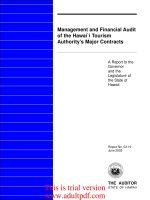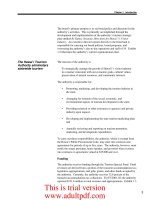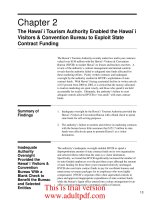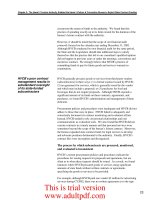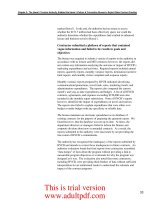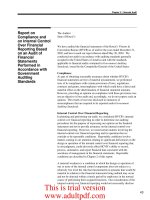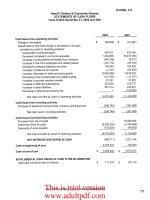Management and Financial Audit of the Hawaii Tourism Authority’s Major Contracts A Report _part1 ppt
Bạn đang xem bản rút gọn của tài liệu. Xem và tải ngay bản đầy đủ của tài liệu tại đây (51.54 KB, 10 trang )
Management and Financial Audit
of the Hawai`i Tourism
Authority’s Major Contracts
A Report to the
Governor
and the
Legislature of
the State of
Hawaii
THE AUDITOR
STATE OF HAWAII
Report No. 03-10
June 2003
This is trial version
www.adultpdf.com
The Office of the Auditor
The missions of the Office of the Auditor are assigned by the Hawaii State Constitution
(Article VII, Section 10). The primary mission is to conduct post audits of the transactions,
accounts, programs, and performance of public agencies. A supplemental mission is to
conduct such other investigations and prepare such additional reports as may be directed by
the Legislature.
Under its assigned missions, the office conducts the following types of examinations:
1. Financial audits attest to the fairness of the financial statements of agencies. They
examine the adequacy of the financial records and accounting and internal controls, and
they determine the legality and propriety of expenditures.
2. Management audits, which are also referred to as performance audits, examine the
effectiveness of programs or the efficiency of agencies or both. These audits are also
called program audits, when they focus on whether programs are attaining the objectives
and results expected of them, and operations audits, when they examine how well
agencies are organized and managed and how efficiently they acquire and utilize
resources.
3. Sunset evaluations evaluate new professional and occupational licensing programs to
determine whether the programs should be terminated, continued, or modified. These
evaluations are conducted in accordance with criteria established by statute.
4. Sunrise analyses are similar to sunset evaluations, but they apply to proposed rather than
existing regulatory programs. Before a new professional and occupational licensing
program can be enacted, the statutes require that the measure be analyzed by the Office
of the Auditor as to its probable effects.
5. Health insurance analyses examine bills that propose to mandate certain health
insurance benefits. Such bills cannot be enacted unless they are referred to the Office of
the Auditor for an assessment of the social and financial impact of the proposed
measure.
6. Analyses of proposed special funds and existing trust and revolving funds determine if
proposals to establish these funds are existing funds meet legislative criteria.
7. Procurement compliance audits and other procurement-related monitoring assist the
Legislature in overseeing government procurement practices.
8. Fiscal accountability reports analyze expenditures by the state Department of Education
in various areas.
9. Special studies respond to requests from both houses of the Legislature. The studies
usually address specific problems for which the Legislature is seeking solutions.
Hawaii’s laws provide the Auditor with broad powers to examine all books, records, files,
papers, and documents and all financial affairs of every agency. The Auditor also has the
authority to summon persons to produce records and to question persons under oath.
However, the Office of the Auditor exercises no control function, and its authority is limited to
reviewing, evaluating, and reporting on its findings and recommendations to the Legislature and
the Governor.
THE AUDITOR
STATE OF HAWAII
Kekuanao‘a Building
465 S. King Street, Room 500
Honolulu, Hawaii 96813
This is trial version
www.adultpdf.com
The Auditor State of Hawaii
OVERVIEW
Management and Financial Audit of the Hawai`i Tourism
Authority's Major Contracts
Report No. 03-10, June 2003
Summary
Pursuant to Section 23-13, Hawai‘i Revised Statutes, our office conducted a
management and financial audit of the Hawai‘i Tourism Authority’s major contracts.
A major contractor is one awarded a contract or agreement in excess of $15 million.
Three contractors met this criteria: Hawai‘i Visitors & Convention Bureau (HVCB),
SMG, and the National Football League. We focused exclusively on the two
marketing contracts valued at $151.7 million with the Hawai‘i Visitors & Convention
Bureau, by far the largest of the three contractors.
We found that inadequate oversight by the authority provided HVCB with a blank
check to spend state funds for self-serving purposes. For example, we found that
HVCB increased the compensation of its state-funded employees by 42 percent over
the past three years—from $3.7 million in CY2000 to $5.3 million in CY2002—
although the amount of state funding for those same years remained relatively
unchanged. The bureau also used state contract funds to pay for exorbitant bonuses
and unnecessary severance packages for its employees who were already highly
compensated. For example, eight employees were paid between $90,000 and
$170,000 with state funds in CY2002. Although it was not obligated to do so, HVCB
paid and accrued approximately $202,000 in severance pay using state contract funds.
One employee’s severance pay was approximately $141,000, nearly the equivalent of
that employee’s annual salary.
The bureau also expended $191,000 in state contract funds for other inappropriate or
questionable expenditures. Such expenditures included paying for an employee’s
parking and speeding tickets and reimbursing an employee for the employee’s family
travel expenses. These expenditures violate HVCB’s own travel and entertainment
policy. We also found an unusual arrangement whereby the state-funded salary of
HVCB’s vice president in Japan is supplemented by an airline. HVCB asserts that this
arrangement does not give that airline an unfair advantage in negotiating favorable
cooperative marketing partnerships. However, any arrangement that presents even
the appearance of a conflict of interest should be avoided so that marketing activities
supported by state contract funds are not tainted. Furthermore, we question the
propriety of HVCB using its consultant law firm, paid with state funds, to perform
legal services that sought to undermine the authority and the State.
The bureau also exercised poor management and oversight over its state-funded
contractors. For example, rather than formally evaluating its subcontractors, HVCB
relied on personal relationships and oral communication to evaluate its state-funded
subcontractors. We also found that HVCB awarded a $242,000 state-funded
subcontract to a vice president’s firm on the same day she resigned as HVCB vice
president for developing international markets. In addition, the bureau did not execute
contracts in a timely manner, procured services that were beyond the scope of its state
contracts, and maintained contract files that were incomplete and
disorganized. We
also found questionable arrangements between the former governor’s office and
HVCB that raise questions about whether the former governor’s office used HVCB
to circumvent the State Procurement Code.
This is trial version
www.adultpdf.com
Report No. 03-10 June 2003
Marion M. Higa Office of the Auditor
State Auditor 465 South King Street, Room 500
State of Hawaii Honolulu, Hawaii 96813
(808) 587-0800
FAX (808) 587-0830
In what is perhaps our most serious finding, our consultant CPA firm declared a
qualified opinion on HVCB’s financial statements for the year ending December 31,
2002. The consultant found that HVCB committed funds in one year to pay for future
goods and services of another year—a direct violation of generally accepted accounting
principles. For example, in November 2001, HVCB accrued approximately $1
million to an advertising company although no related services were provided by
December 31, 2001. It appeared that the advertising company pre-billed HVCB for
services it had yet to provide. By doing so, HVCB was able to spend exactly up to its
state contract limit and circumvent the potential return of unexpended funds to the
authority.
We also found that the authority’s lax monitoring and enforcement of its contracts with
HVCB left little assurance that $151.7 million in state funds were effectively spent.
Specifically, we found that poorly constructed contracts and inadequate contract
monitoring and enforcement by the authority did not adequately protect the State’s
interests. For example, the plethora of reports submitted by HVCB contained vague
information that failed to tie results to goals and objectives.
We also assessed the actions taken by the authority in response to our previous audit,
Management Audit of the Hawai‘i Tourism Authority, Report No. 02-04. The
authority has taken steps to address some of the other management deficiencies
discussed in our prior audit. For example, the authority created a marketing
department to oversee marketing contracts, drafted contracting policies and procedures,
and clarified staff roles and responsibilities. Furthermore, the authority conducted a
performance evaluation of both itself and HVCB. However, the authority continues
to allow HVCB to provide services without a signed contract.
We recommended that the authority’s board of directors and its executive director
improve contractor accountability, enforce contract provisions, improve contract
language, and maintain and apply contracting policies and procedures. We also
recommended that the State and Legislature take appropriate steps to assess the extent
to which HVCB violated generally accepted accounting standards during the course
of its state marketing contracts.
In written comments on a draft of our report, the authority’s board chair and executive
director accepted our findings and recommendations. They acknowledged our audit
as a tool to improve its operations, respond to legislative questions and concerns,
ensure contractor compliance, minimize the state’s liability, and optimize the state’s
expenditures for tourism promotion. Their response also reiterated that the authority
takes very seriously its responsibility to the public to be a fiscally accountable
organization.
We note that the authority specifically commented on three points in our report. While
we take no issue with the authority’s comments, we stand by the statements in our
report and our strengthened recommendations.
Recommendations
and Response
This is trial version
www.adultpdf.com
Management and Financial Audit
of the Hawai`i Tourism
Authority's Major Contracts
Report No. 03-10
June 2003
A Report to the
Governor
and the
Legislature of
the State of
Hawaii
Conducted by
The Auditor
State of Hawaii
and
Nishihama &
Kishida, CPA's, Inc.
THE AUDITOR
STATE OF HAWAII
Submitted by
This is trial version
www.adultpdf.com
Foreword
This is a report of our management and financial audit of the Hawai‘i
Tourism Authority’s major contracts. This audit was conducted pursuant
to Section 23-13, Hawai‘i Revised Statutes, which directs the Office of
the Auditor to conduct, at least every five years, a management and
financial audit of all contracts or agreements awarded by the authority to
major contractors to determine if the authority and these contractors are
in compliance with all relevant programmatic and financial requirements.
We wish to express our appreciation for the cooperation and assistance
extended to us by the Hawai‘i Tourism Authority, Hawai‘i Visitors &
Convention Bureau, and others whom we contacted during the course of
the audit.
Marion M. Higa
State Auditor
This is trial version
www.adultpdf.com
v
Table of Contents
Chapter 1 Introduction
Background 1
Objectives of the Audit 11
Scope and Methodology 11
Chapter 2 The Hawai`i Tourism Authority Enabled the
Hawai`i Visitors & Convention Bureau to
Exploit State Contract Funding
Summary of Findings 13
Inadequate Authority Oversight Provided the Hawai`i
Visitors & Convention Bureau With a Blank
Check to Benefit the Bureau and Selected
Entities 13
The Authority's Lax Monitoring and Enforcement
of Its Marketing Contracts with the Bureau Leaves
Little Assurance that $151.7 Million in State
Funds Were Effectively Spent 30
Conclusion 38
Recommendations 39
Chapter 3 Financial Audit
Summary of Findings 41
Independent Auditors' Report 41
Report on Compliance and on Internal Control Over
Financial Reporting Based on an Audit of Financial
Statements Performed in Accordance with
Government Auditing Standards 43
Description of Financial Statements 44
Notes to Financial Statements 44
Responses of the Affected Agencies 55
This is trial version
www.adultpdf.com
vi
List of Exhibits
Exhibit 1.1 Hawai`i Tourism Authority Board Members 2
Exhibit 1.2 Hawai`i Tourism Authority - Organizational
Chart 4
Exhibit 1.3 Hawai`i Tourism Authority Revenues and
Appropriations, FY1999-2000 to FY2001-02 5
Exhibit 1.4 Hawai`i Visitors & Convention Bureau
Organizational Chart 7
Exhibit 1.5 Hawai`i Visitors & Convention Bureau Sources
of Funding, CY2000 to CY2002 9
Exhibit 1.6 Hawai`i Visitors & Convention Bureau Meetings,
Conventions & Incentives Contract Expenditures,
CY2002 10
Exhibit 1.7 Hawai`i Visitors & Convention Bureau Leisure
Contract Expenditures, CY2002 10
Exhibit 2.1 HVCB Staff Paid with State Contract Funds
CY1998 to CY2002 15
Exhibit 2.2 Examples of Inappropriate Contract-Funded
Expenditures 19
Exhibit 2.3 Examples of Excessive Reimbursement for HVCB
Employees 20
Exhibit 2.4 Expenditure Flow Under Contract Between HCC
and DBEDT/HTDC 31
Exhibit 3.1 Hawai`i Visitors & Convention Bureau Statements
of Financial Position, December 31, 2002 and
2001 51
Exhibit 3.2 Hawai`i Visitors & Convention Bureau Statements
of Activities, Years Ended December 31, 2002
and 2001 52
Exhibit 3.3 Hawai`i Visitors & Convention Bureau Statements
of Cash Flows, Years Ended December 31, 2002
and 2001 53
Exhibit 3.4 Hawai`i Visitors & Convention Bureau In-Kind
Contributions At Fair Value, Years Ended
December 31, 2002 and 2001 54
This is trial version
www.adultpdf.com
1
Chapter 1: Introduction
Chapter 1
Introduction
In 2002, the Legislature amended Chapter 23, Hawai`i Revised Statutes
(HRS), to direct the Auditor to conduct a management and financial
audit of all contracts or agreements awarded by the Hawai`i Tourism
Authority to a major contractor every five years. Each audit is to
determine if the authority and its major contractors are in compliance
with all relevant programmatic and financial requirements. A “major
contractor” is defined as any contractor to whom a contract or agreement
has been awarded that is valued in excess of $15 million. The
Legislature required that the first audit be conducted by July 1, 2003 and
include a review of:
• The responsibilities, services, and activities of all major
contractors;
• The propriety of expenditures;
• Compliance by all major contractors with any laws and rules that
may be in effect;
• The management and oversight of all major contractors by the
authority; and
• Any additional issues that the Auditor deems appropriate.
In 1998, the Legislature recognized the importance of coordinating the
State’s development, marketing, and research of the tourism industry.
The Hawai`i Tourism Authority was thus established in Chapter 201B,
HRS, as the lead tourism agency for the State of Hawai`i. The authority
reports directly to the governor and Legislature and is attached to the
Department of Business, Economic Development and Tourism (DBEDT)
for administrative purposes. A board of directors heads the authority,
and an executive director oversees the authority’s staff.
The board is comprised of 15 members—12 public members and three
ex-officio members. Of the 12 public members, at least six must have
expertise in visitor industry management, marketing, promotion,
transportation, retail, entertainment, or visitor attractions. At least one
public member must have expertise in Hawaiian cultural practices, and
Hawai`i’s four counties must be represented on the board. Exhibit 1.1
lists the names of board members as of April 2003.
Background
This is trial version
www.adultpdf.com
2
Chapter 1: Introduction
Exhibit 1.1
Hawai`i Tourism Authority Board Members
Mike McCartney, Chair At-large
President and CEO, Hawai`i Public Television
Ron Wright, Vice-Chair At-large
Managing Director, Sales and Marketing – Hawai`i,
Continental Airlines
W. David P. Carey, III At-large
President and CEO, Outrigger Enterprises, Inc.
Kyoko Kimura County of Maui
President and General Manager, Diamond Resort Hawai`i Corporation
Rodney K. Haraga Ex-officio
Director, Department of Transportation
Lawrence M. Johnson At-large
Chairman of the Board and Chief Executive Officer (retired),
Bank of Hawai`i
Lenny Klompus Ex-officio
Director of Communications, Governor’s Office, Designated Representative
Department of Business, Economic Development & Tourism
Benjamin A. Kudo At-large
Chief Financial Officer and Director, Imanaka Kudo & Fujimoto
Nadine Nakamura County of Kaua`i
Principal, NKN Project Planning
Lorrie Lee Stone At-large
Attorney-at-Law, Rohlfing and Stone
Sharon Weiner City & County of Honolulu
Group Vice-President, Business Development, Public Relations and
Government Affairs, DFS Hawai`i
Keith Vieira At-large
Senior Vice-President, Director of Operations – Hawai`i,
Starwood Hotels & Resorts Worldwide, Inc.
Stephen Yamashiro County of Hawai`i
Consultant
Peter T. Young Ex-officio
Chair, Board of Land and Natural Resources
Source: Hawai`i Tourism Authority
This is trial version
www.adultpdf.com
